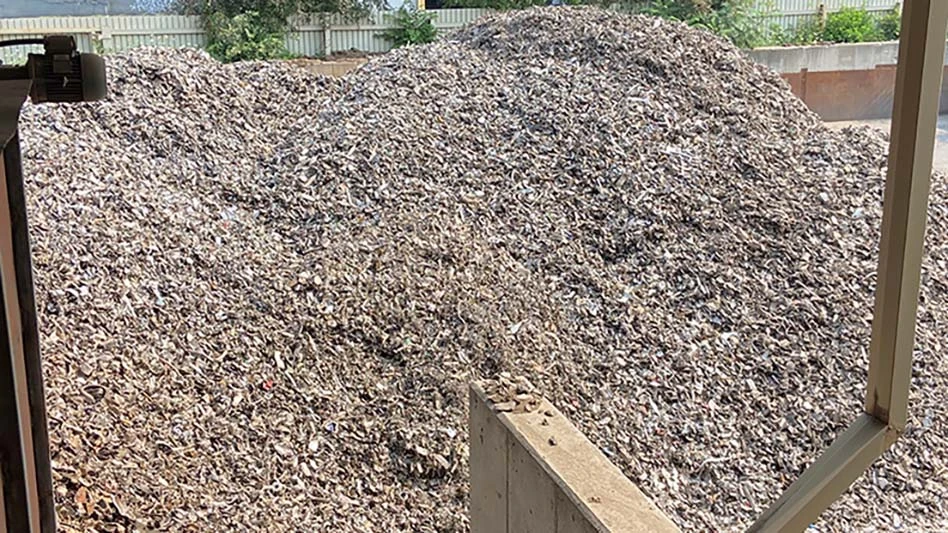
Azek
Azek Co., a Chicago-based building products manufacturer, has launched a new polyvinyl chloride (PVC) recycling program for dealers and contractors. The company’s Azek Full-Circle PVC Recycling Program will work directly with dealers, contractors and mill shops to collect, return and recycle scrap PVC to divert the material from landfills.
Azek says its Full-Circle program will divert materials that would otherwise be disposed at landfills, while reducing contractors’ overhead disposal costs. The program is made possible in part by Azek’s vertically integrated recycling center, Return Polymers, combined with its product technology and network of distributors, dealers and direct customer mill shops. The company says Full-Circle complements its existing integrated polyethylene (PE) recycling initiative used in the TimberTech Pro and TimberTech Edge decking lines.
According to a news release from Azek, this new initiative will make the company one of the largest PVC recyclers in the United States. The company reports that it’s on track to collect more than 2.5 million pounds of PVC scrap this year from direct customers and construction sites. Azek’s Return Polymers sorts and processes the PVC and supplies clean recycled material back to the company’s manufacturing plants for reuse across multiple product lines.
Becoming vertically integrated
In February of this year, Azek acquired Ohio-based Return Polymers to help the company’s supply chain. Return Polymers has been in business for about 27 years in north-central Ohio. The recycler collects PVC, grinds it, characterizes the material in a lab and turns the material into a mechanical blend that original equipment manufacturers (OEMs) can use for decking and other products.
Ryan Hartz, vice president of sourcing at Azek, says the two companies had a supplier-partner relationship for about one to two years prior to the acquisition.
“It became very evident that [Return Polymers was] at the forefront of PVC recycling,” Hartz says. “They had a lot of knowledge and customer takeback programs we knew would fit in nicely in our supply chain. During the beginning phases of us looking at this acquisition, we started challenging one another saying, ‘What are those hard-to-recycle PVC waste streams that almost always end up in landfill?’ and ‘How can we consume those?’ It was eye-opening.”
Dave Foell, president of Return Polymers, adds that his company had been looking for a larger firm to acquire its business in order to grow as well.
“We had to either acquire people to get to the next size or be acquired and find a strategic buyer to grow through other acquisitions,” he says. “In my mind, we could have stayed a good size for a long time, but it made more sense to either be bought or keep acquiring.”
Since Azek already had a partnership with Return Polymers, Foell says he recognized that Azek was a company with a big sustainability story.
Hartz adds that Azek recognized that if it wanted to advance in PVC recycling and diverting PVC from landfill, Azek needed to be more than just supplier partners with Return Polymers. He says acquiring the Ohio-based recycler and leveraging its research and development team would help take its sustainability efforts to the next level.
Since the acquisition, Foell says Return Polymers has retained its name and its 80 employees. He notes that Return Polymers’ transition to joining the Azek business has gone quickly and smoothly.
Leveraging partnerships
Hartz says Azek leverages partnerships to help advance its sustainability goals.
“When you can find organizations that have similar core principles, good things tend to happen,” he says.
Recently, Berry Global, Evansville, Indiana, signed a formalized working agreement with Azek’s Azek Building Products business in September. Through the agreement, Azek will use Berry’s mixed-material, postindustrial scrap to make residential and commercial building materials, such as composite decking. The recycled plastic will come from Berry’s operations across multiple facilities and divisions in North America.
“When we started talking about continuing to drive more recycled content and waste diversion, Berry came to the forefront of our minds,” Hartz says. “We started a dialogue with Berry Global and found that many of our core principles aligned.”
Berry says its collaboration with Azek represents its focus on investments in mechanical and advanced recycling, the innovative use of recycled material in products and global commitments to address plastic waste in the environment.
Azek operates manufacturing facilities in Ohio, Pennsylvania and Minnesota. In addition to the PVC recycling done by Return Polymers, Azek also operates a PE recycling facility in Wilmington, Ohio. Hartz says the company is trying to bring as much recycling in-house as possible, which helps the company to meet recycled-content specifications it needs in its decking products.
Looking ahead, Hartz says the company plans to continue its focus on incorporating recycled content in its products. He adds that the company has received positive feedback on that front from its customers as well.
“We do have annual goals to increase that percentage used in our products,” he says. “That remains the focus—that’s the forefront of the organization. We’re truly committed to these green initiatives and finding ways to impact the world in a positive manner because we know we can help in diverting waste from landfill with our products.”
Latest from Recycling Today
- Ship dismantlers navigate new regulatory regimen
- Gershow announces several community involvement projects
- McKinsey identifies engineering polymers as a recycling opportunity
- Metso acquisition focuses on mill liner recycling
- Malaysian customs office seizes scrap containers
- Lindner establishes Brazil subsidiary
- Tire recycling veteran predicts growth in pyrolysis
- ShearCore adds FC95 to concrete processor line





